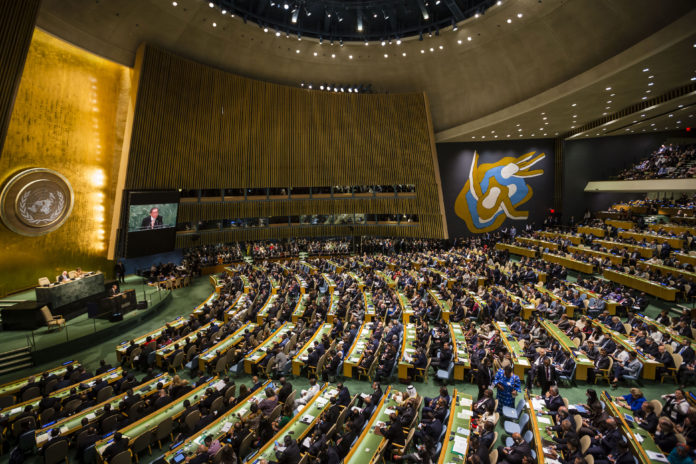Back in 2016
Members of over 150 countries met in a General Assembly led by the International Campaign against Nuclear Weapons (ICAN) organization. A proposal to begin negotiations for the outlawing of nuclear weapons was put forward. 130 countries agreed to the motion and talks were set to begin in early March and end in June or July. The most prominent proposers included Sweden, South Africa, and Brazil while nations like the US and Russia opposed the motion.
The Here and Now
On Monday diplomats from all around the globe showed up for the General Assembly. The agenda was kicking off negotiations with a hope that the talks lead to ‘elimination of nuclear weapons.’ A point to note is that any country that supported the ban will be legally bound to honor the agreement.
The talks to abolish nuclear weapons, which are supported by Pope Francis and the UN Secretary General Antonio Guterres, were received with mixed but convicted reactions.
The US made it clear that it would not participate in the ongoing talks. US Ambassador Nikki Haley said that the negotiations that began on Monday are ‘impractical.’ She was also quoted saying, “I am a mother who would like to see my children grow up in a world without nuclear weaponry. However, the abolition of cold weapons cannot happen at once such as in these talks. That is something that can only happen gradually.”Haley also questioned whether the nations proposing the ban genuinely cared for the welfare of their people. Furthermore, Haley stated, the US had already done away with eighty-five percent of their nuclear weapons under the Nuclear Non-Proliferation Treaty it signed almost half a century ago, and even without the new proposed ban, the United States is in the process of eliminating nuclear weapons on their own.
Other nations against the treaty include Britain and France. The French declared their stance in the negotiations of the proposed ban, stating that nuclear weapons were necessary for the ‘stability and security’ of a nation. Speaking after the Assembly session held on Monday, Britain’s Ambassador Matthew Rycroft said that Britain was abstaining from the UN nuclear abolition talks. He elaborated the abstinence was because his country did not believe that ‘any progress in nuclear disarmament could result from the talks.’ “They cannot and will not work,” Rycroft remarked. Britain has decreased its nuclear weapon arsenal by half since the Cold War.
Russia and China are sitting out the talks while nations like the US and France are attending the sessions but do not plan on signing the agreement come June.
Under Secretary General of the UN disarmament arm, Kim Won-soo says now is the time to do away with nuclear weapons, noting that public awareness of nuclear weaponry had waned. His plea was supported by nations like Ireland and Brazil.
Among those who spoke at Monday’s session was a Japanese survivor of the atomic bombing during the Cold War, Tashiki Fujimori. In an emotional plea to the diplomats present, Fujimori asked for the abolition of nuclear weapons once and for all. “No one else deserves to go through what I went through because of them,” Fujimori said.




